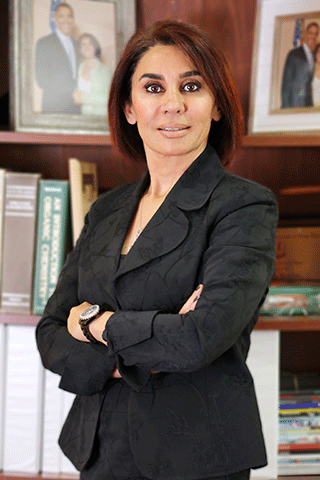Each issue, FlexPack VOICE™ hosts a question-and-answer segment that discusses important issues with an industry leader. This issue, we query Anoosheh M. Oskouian, who is president, CEO, and co-founder of Ship & Shore Environmental, Inc., based in Signal Hill, California.
Ship & Shore Environmental custom engineers, designs, manufactures, and maintains pollution-abatement equipment that treats emissions generated from flexo operations.
“My company caters to many industries—most predominantly the flexible packaging and printing industry—and assists them with clean-air solutions,” Oskouian says. “We also assist with air-quality permitting and aftermarket services and maintenance for these projects,” she adds.
Flex Pack VOICE™: What do you see as the major issues facing the industry in 2020?
Anoosheh M. Oskouian: One of the biggest obstacles of all times (COVID-19) is currently being faced by all industries on a global scale. What I have noticed throughout my years of experience dealing with this industry, however, is that the flexible packaging and printing industry are, overall, quite impervious to economic upsets that may affect other industries. Being a key component to essential businesses has increased the demand for packaging, and, therefore, increased overall production. A potential issue that may arise is the immediate need for pollution-control equipment to keep these production emissions at bay. Luckily, we have a solution for that.
FPV: What are the long-term challenges?
AO: Outside of our current situation, one of the challenges the overall packaging industry has faced is the “anti-plastics” stigma. Pre-COVID times were full of legislative rules and societal pressures to ban the use of single-use plastics. Now, more than ever, people are starting to realize that the entire plastics industry is actually playing a key role in keeping consumers alive and healthy during this health crisis. The fear is that after this current emergency passes, the negative view on plastics may eventually return to how it once was.
FPV: How do you see government regulations as they pertain to the industry?
AO: Government air-quality regulations will continue to curb and control emissions—based on attainment and nonattainment regions. The industry should stay on course, as rules will eventually become more stringent, because the overall purpose is to ensure facilities abide by emission limits dictated by the government agencies.
Government agencies that implement stringent air-quality regulations should make sure there is equipment available to support their specified enforcement. This equipment should be the Best Available Control Technology as designated.
FPV: In what ways should the industry promote sustainability?
AO: As every business or leader should know by now, sustainability is extremely important for not only company longevity, but for overall industry growth, as well. Partnering with an environmental company, showcasing green efforts, and implementing clean-air solutions are all ways the industry can promote sustainability. With every aspect in life—no matter the industry—balance is important. The more your facility grows, the greater the need for pollution control and sustainability efforts, so find the balance.
FPV: What are the qualities of flexible packaging that an average consumer may not appreciate?
AO: Business owners as consumers should understand that flexible packaging is becoming more essential than ever before. Not only does it weigh less versus alternative packaging, but it also has better warehouse storage and makes for easier transport.
Retail consumers are starting to realize that flexible packaging provides great protection from any outside exposure. Flexible packaging can be the answer for most consumables, as it provides a clean, sanitary, flexible, noncontaminable, and durable vessel for all our essential food, beverages, pharmaceuticals, and supplies.
FPV: Talk a little bit about what got you into the industry and why you chose it as a career path.
AO: One of the reasons that I personally like to pursue and make connections in this industry is because the flexible packaging sector is quite impervious to anything that may happen in the overall world. This industry is constantly innovating, growing, and establishing new heights. Take our current situation as the perfect example—flexible packaging is such an essential operation.
I chose the environmental side as a career path because it not only allowed me to use my genuine love for engineering, but, at the end of every day, I can say that I have made a difference in the effort toward cleaner air and saving the planet.
FPV: Who was your mentor?
AO: In terms of the environmental field, my mentor would definitely have to be John Von Bargen, co-founder of Ship & Shore Environmental and currently still the VP of engineering. Until this day, I have yet to find a more brilliant, innovative, and forward thinker than John.
FPV: What advice would you give to a hiring manager who is seeking people with a technical background? What they should be looking for?
AO: Find someone who not only has a positive attitude, but also a willingness to learn. They should be flexible and adaptable to the ever-changing dynamics of the industry and the workplace.
FPV: What about someone who is hiring for a sales position?
AO: They have to be able to think quickly, but also logically. They must have enough technical background knowledge to support the things they say. Overall, a salesperson should be a solutions provider and listen to their customers, so they can come up with the best solution for their needs. Also, reputation is everything. Always be honest, truthful, and care about what you are doing and who you are selling to.
